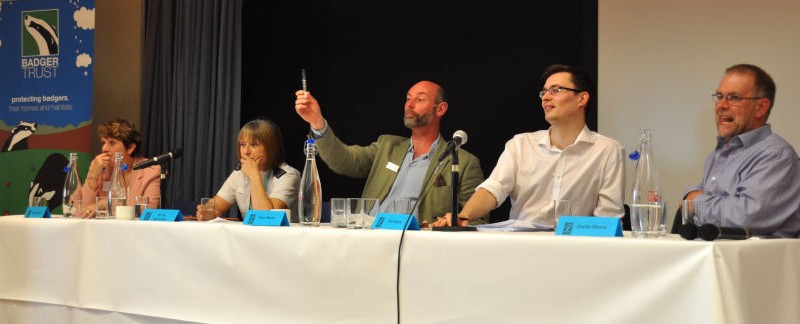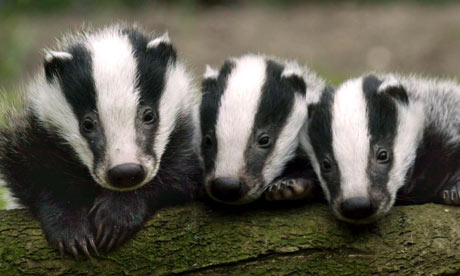 The Badger is a protected UK species, however the last year has seen some very upsetting culling of our much loved friends. In the light of the impending General Election, The Badger Trust decided to host a very important debate in Bristol on Saturday the 18th of April 2015. A groundbreaking debate on the subject of The Badger Cull and Wildlife Crime. I was invited to attend the debate along with Green World TV in order to highlight many of the conflicting opinions on the UK badger cull.
The Badger is a protected UK species, however the last year has seen some very upsetting culling of our much loved friends. In the light of the impending General Election, The Badger Trust decided to host a very important debate in Bristol on Saturday the 18th of April 2015. A groundbreaking debate on the subject of The Badger Cull and Wildlife Crime. I was invited to attend the debate along with Green World TV in order to highlight many of the conflicting opinions on the UK badger cull.
There were some very significant speakers present including Dominic Dyer from The Badger Trust, Care for the Wild & Born Free, Peter Martin chairman for The Badger Trust, Mark Jones, Vet & Wildlife Manager for Born Free, Roger Blowey, Livestock Vet, Tom Quinn, director of Campaigns for The League Against Cruel Sports, John Blackwell, president of the BVA and Professor John Bourne Chairman of the Independent Scientific Group.
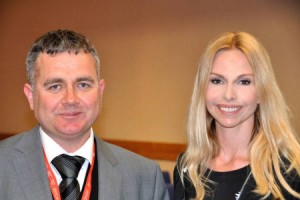
Dominic Dyer with Anneka
The Badger Cull Debate was chaired by Dominic Dyer due to the absence of Jonathan Leake of the Sunday Times. The debate was opened with a presentation / speech from each of the speakers.
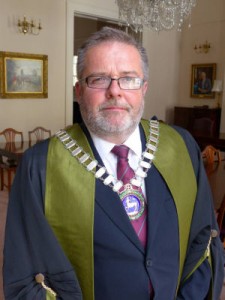
John Blackwell
John Blackwell from the BVA made it clear that he supports combined methods of control of TB in cattle which includes slaughter of affected cattle, vaccination and restriction of movement in herds. He supports vaccines in cattle however suggests that the current vaccines are not good enough to be effective right now. He did make it clear that he felt that it could not be proven that shooting badgers is humane therefore would like to see an increase in trapping and controlled shooting in its place. This would also allow the testing of badgers for bTB before dispatching.
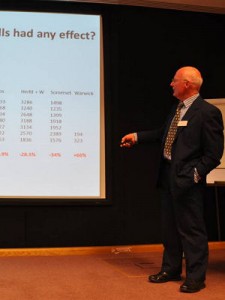
Roger Blowey
John Blackwell was followed up by Livestock Vet Roger Blowey who wanted to speak about Bovine TB from a historical perspective as well as current. He made it clear that he would like everyone to work together in addressing the problem of TB. This statement was not taken well by the audience and various people suggested that this would not happen as people interested in the protection of badgers could not and would not support the cull in any way or form. Richard spoke about how bTB used to be an issue in the early 1900’s when it could be caught from milk drank from an affected cow but due to modern day pasteurization, this risk is now no more. He showed some graphs to the audience which showed how after the high slaughter of cattle in 1959, there was a period of very low bTB in the UK and now after 1998, the figures have sky rocketed. In 1986 he suggested there were 235 cattle affected in the UK and in 2014 there was 14000.
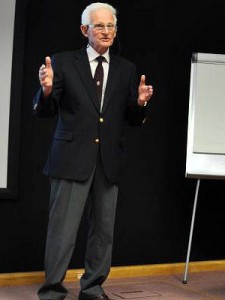
Professor John Bourne
Professor John Bourne then took the stage and made it clear that he felt that culling is just a temporary solution to the problem which doesn’t last. He got into a fairly heated debate with Roger Blowey over conflicting opinions. John Bourne made it clear that we should be following Australia where they restricted movement of cattle very tightly and also removed affected cattle immediately. He criticised the fact that this was not done in the UK. Also after the Foot and Mouth Crisis there was a break in the regular testing of cattle, allowing infected cattle to increase in numbers. In Australia, they are very strict with the regular testing of cattle, where as in the UK, we are far more relaxed and do far less testing. He mentioned cases of cattle being tested for bTB and registering negative but then testing positive 7 years later, so testing is imperative for prevention of the disease long-term. He mentioned that in the 70’s all the focus was on killing badgers rather than addressing infected cattle which was a grave error. He suggests focusing solely on Bovine TB control in cattle and leaving the badger alone. Cattle movement needs restricting and no point offering a vaccine as the current one only works in 60% of cases. Also he mentioned that the Badger cull is extremely expensive and if the millions wasted in badger control was given to farmers instead to help them when their cattle is removed, it would be a far better method. John said that if he could do anything, he would chop the UK in half, remove affected cattle from the SW where the bTB is most prevalent and try vaccinates in the north only on clean herds.
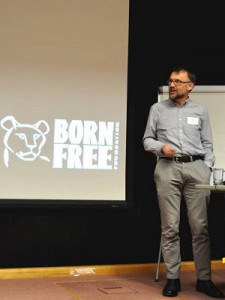
Mark Jones
Mark Jones, Vet and wildlife manager for Born Free took to the stage and immediately summed up the badger cull in four simple words ‘unscientific, ineffective, inhumane and unnecessary’. He suggested that badger culling only provided a temporary reduction of the disease in herds and that different methods of control are used inconsistently rather than the same everywhere so no real evidence could be gained. More blood testing is needed in cattle (Gamma Interferon) in place of the less effective Tuberculin skin tests which do not always show infection. He stated that the current policy is unscientific and ineffective and that shooting was inhumane. He suggested that 7.4% – 22.8% of badgers were still alive after 5 minutes and less than 45% were shot in the correct part of the body to give a humane death. He also mentioned that the press surrounding the cull creates a fever in the UK population and a demonization of the badger resulting in higher levels of general badger hatred and abuse. He also agreed with John Bourne that after The Foot & Mouth Crisis, the lack of tests did affect bTB in cattle which was a contributing factor to the current high levels of the disease. Wales has seen a 50% decrease in bTB since 2009 due to high levels of testing and total restriction of movement of cattle. He said that this proves this is effective. Mark quoted that £6.3 million pounds has been spent on the cull resulting in 2500 badgers dead in the last couple of years is costly and ineffective and should be stopped. An interesting term Mark Jones brought up was ‘zoonosis’ which is where the government is legally forced to mention bTB is a health threat to the UK population despite it being close to zero. As people now days cook their meat on a high heat and pasteurise milk, there is currently no threat to people, however the threat still has to be mentioned despite it being really tiny – this results again in fear from the ignorant population and spurring an unnecessary desire to support culling badgers for fear of children contracting the disease.
A member of the audience suggested that culling badgers may also affect natural resistance as many badger sets have been found to be resistant to the disease so by random culling, badgers with possible antibodies may be removed resulting in a weaker immunity.
It was concluded that there is very little evidence of spread of bTB between badgers as they stick to their own sets and if left alone, it dies off over time anyhow. It was suggested that the cull is stopped as it is inhumane and ineffective and more emphasis made to control the disease in cattle rather than killing a protected species.
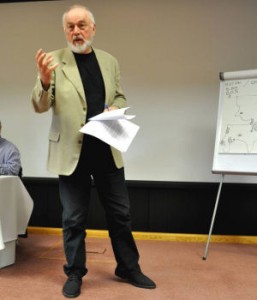
Peter Egan
Actor Peter Egan of Downton Abbey and Patron to many animal charities then took the stage with a wondrous finale to the debate. His idea to solve the badger cull problem was black and white to him ‘Do not eat flesh’. He suggested that if everyone were vegan then there would be no affected cattle and therefore no dead badgers. It was very refreshing to have a heartfelt end to the debate after the science. He read out a beautiful poem written by Virginia McKenna on Moon Bears which concluded the debate.
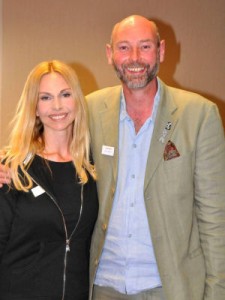
Anneka with Peter Martin
The Cull debate was followed by a Wildlife Crime debate chaired by Peter Martin of The Badger Trust which was more based around questions of generalised wildlife crime in the UK. A wildlife police officer was present in order to help answer questions and many topics were discussed including illegal shooting, snares, filling up of badger sets, fox hunting and reporting crime to your local wildlife officer.
All in all a wonderful day and in conclusion, everyone agreed that ‘The Badgers Won’.

